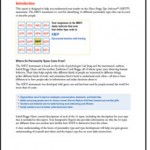
- Wednesday, July 09, 2025
- Stay Connected
Widgetized Section
Go to Admin » Appearance » Widgets » and move Gabfire Widget: Social into that MastheadOverlay zone
What’s Your Type?
How using type theory can help you become more effective at the office
 While most people think of assessments like The Myers-Briggs Type Indicator® (MBTI®) as career-planning tools, understanding Type can help you become a better communicator.
While most people think of assessments like The Myers-Briggs Type Indicator® (MBTI®) as career-planning tools, understanding Type can help you become a better communicator.
Type theory is based on observations by Swiss psychologist Carl Jung and the instrument’s authors, Isabel Briggs Myers and her mother Katherine Cook Briggs. The goal of the mother-daughter team was to help explain why different kinds of people are interested in different things, are good at different kinds of work and sometimes find it difficult to understand each other.
Type theory provides a framework to understand behavior. It describes 16 dynamic energy systems, not static boxes that define who we are. A person’s four-letter type is more than a simple addition of their reported preferences; it is the interaction of the preferences with one another.
Put simply, Type theory is based on the idea that everyone has natural preferences in the way we do things, these preferences are seen on four dichotomies or opposite poles.
We each have a natural preference for where we prefer to focus our attention and get energy (Extraversion/Introversion), we have preferred ways of taking in information (Sensing/iNtuition), the way we prefer to make decisions (Thinking/Feeling) and how we orient themselves or interact with the outside world (Judging/Perceiving process).
Here, is a brief overview of the first dichotomy: Extroversion/Introversion. In Type theory, the Extrovert/Introvert scale doesn’t refer to being outgoing or quiet and shy, it relates to how you focus your energy.
Extroverts generally:
- Are energized by being around other people
- Have lots of friends
- Have many different interests
- Communicate freely; take the initiative when making contact with others
- Think best when talking with others
- Often prefers to communicate and learn by talking and listening
Introverts generally:
- Are energized by your inner resources
- Have a small number of close friendships, are reserved when communicating with others
- Have a few, deep interests
- Think best when they’re pondering the situation alone
- Often prefers to communicate by reading and writing
- How can this help you become more effective?
When you’re having a meeting, send out an agenda in advance so introverts can be ready to contribute. And make sure that Extroverts have enough time and space to “think out loud.”
When you’re working with a client be sure to ask whether they prefer you to contact them by phone or email. Introverts like to read and consider what you have to say. Extroverts like to think as they’re talking.
When you’re planning your day include some down time to restore your energy if you’re an Introvert. On the other hand, if you’re an Extrovert try not to spend all day, every day working alone at the computer. Spending time with others will energize you.
While the MBTI is a great tool for helping you plan a new career, it can also help you communicate more effectively and work more efficiently. While the primary reason to take an assessment is to understand yourself better, the bonus is that you may understand your coworkers better too.





You must be logged in to post a comment Login